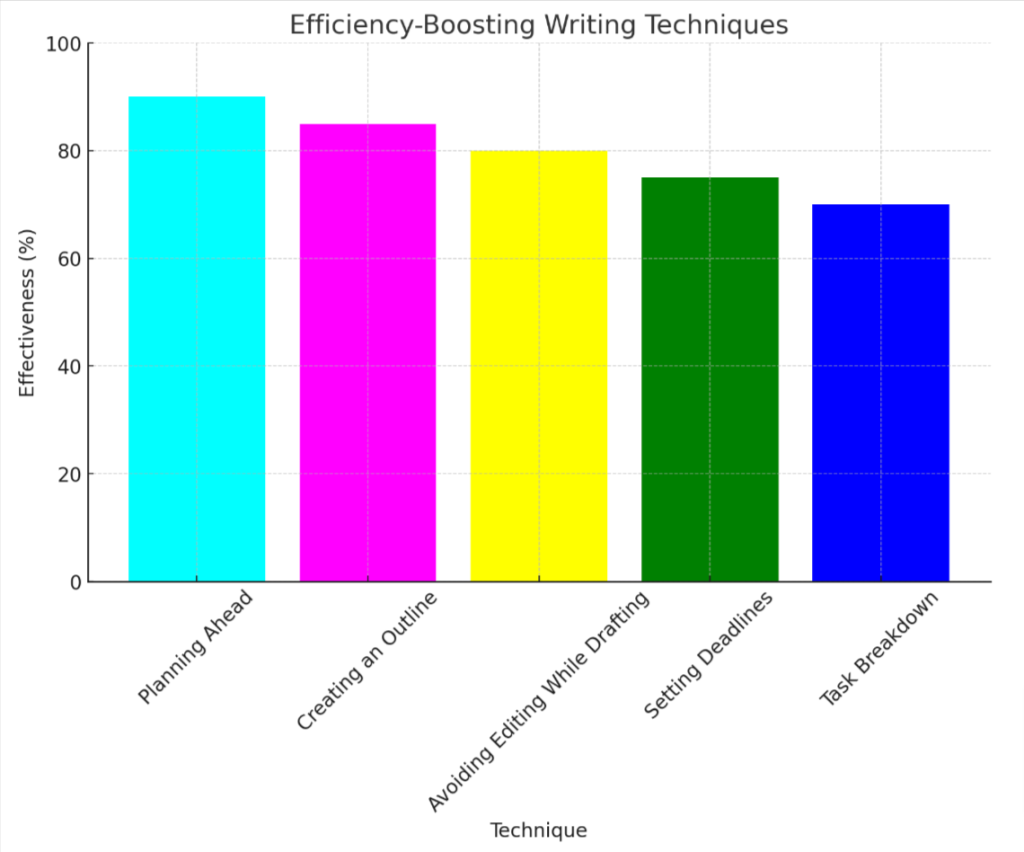Streamlining Your Writing Process: Balancing Efficiency and Quality
“Struggling to write quickly without losing the quality of your work? You’re not alone. In fact, most writers grapple with this delicate balancing act. This blog post is here to guide you on how to increase your writing efficiency while still maintaining high-quality content.
Ready to hit the fast track?”.
Key Takeaways
- Writing efficiently combines speed and quality, allowing you to maximize productivity and achieve better results.
- Tips for writing faster include planning ahead, creating an outline, avoiding editing while drafting, setting achievable deadlines, and breaking tasks into smaller ones.
- Tools like AI writing assistants, voice-to-text converters, and software tools can help improve writing speed without compromising quality.
- To maintain quality while writing efficiently, take regular breaks, avoid distractions, consider outsourcing to a professional editor for thorough proofreading and feedback. Stay motivated and consistent in your writing practice to continuously improve your skills.
Importance of Writing Efficiently
Writing efficiently is vital for combining speed and quality in your writing process, allowing you to maximize productivity and achieve better results.
Combining speed and quality
Striking a balance between speed and quality in writing is crucial for productivity. Writers who integrate these two elements can craft compelling content quicker without reducing its standard.
This synergy doesn’t just happen; it requires adopting the right strategies such as pre-planning, using AI tools, and regular practice. With this approach, you won’t have to sacrifice the quality of your work for speed or vice versa – you get the best of both worlds consistently!
Maximize productivity and results
Efficient writing paves the way to maximizing productivity and results. Focused strategies like setting clear goals can substantially increase your output without compromising quality.
By defining what needs to be achieved in each writing session, you create a roadmap that guides your process. This saves time and spurs motivation, leading to an enhanced writing productivity.
Tools like word sprints or the Pomodoro Technique are designed to bolster this productive mindset. Word sprints encourage you to write as quickly as possible for short bursts, while the Pomodoro Technique breaks work into manageable 25-minute chunks.
These methods push against procrastination and promote a continuous flow of ideas, driving both speed and efficiency in your writing routine.
Tips for Writing Faster
Plan ahead, conduct research in advance, create a structured outline, and avoid editing while drafting. Set achievable deadlines and break tasks into smaller ones to stay on track.
Plan and research ahead of time
Planning and researching before you start writing is a pivotal step to maximize your efficiency. This initial stage allows you to gather all the necessary information for your piece, thereby minimizing time wasted on unnecessary details during the actual writing process.
As this groundwork lays the foundation of your content, it promises clarity in thoughts and ideas that reflect in your final work. In essence, with thorough preparation at hand, you steer clear from hurdles that might slow down or obstruct your creative flow while drafting.
Create an outline for structure
To increase writing efficiency, it’s important to create an outline for structure. An outline helps organize your thoughts and ensures that you stay focused on the main points of your piece.
Start by identifying the key ideas or arguments you want to convey and then break them down into subtopics or supporting details. This will provide a clear roadmap for your writing, making it easier to develop coherent paragraphs and maintain a logical flow throughout your work.
By having a solid outline in place, you can save time by avoiding unnecessary tangents or revisions later on.

Avoid editing while drafting
To write more efficiently, it’s important to avoid editing while drafting. When you constantly stop to edit and revise as you go, it slows down your writing process and hampers your productivity.
Instead, focus on getting your thoughts onto paper first without worrying about perfection. By allowing yourself to freely write without interruption, you can tap into a state of flow and get into a rhythm that increases your speed and creative output.
Save the editing for later stages when you have completed the draft.
Set achievable deadlines
To write more efficiently without compromising quality, it’s crucial to set achievable deadlines. Establishing realistic timelines for each writing task helps keep you on track and prevents procrastination.
By breaking down larger projects into smaller subtasks with specific deadlines, you can manage your time effectively and stay focused. This approach ensures that you have a clear roadmap and allows you to allocate sufficient time for research, planning, drafting, editing, and revising.
Meeting these mini-deadlines not only boosts productivity but also reduces stress by preventing last-minute rushes.
Break tasks into smaller ones
Breaking tasks into smaller ones is a key strategy for writing more efficiently. When you tackle large projects, it can feel overwhelming and lead to procrastination. By breaking down your writing tasks into smaller, manageable pieces, you can stay focused and make progress consistently.
This approach allows you to set achievable goals and track your progress along the way. Whether it’s outlining different sections or setting specific word count targets for each session, breaking tasks into smaller ones helps improve productivity and keeps you motivated throughout the writing process.
With this strategy, you’ll find that completing your writing projects becomes less daunting and more attainable.

Tools to Help Improve Writing Speed
There are several tools available to help improve writing speed, such as AI writing assistants, voice-to-text converters, and software tools.
AI writing assistants
AI writing assistants are powerful tools that can significantly improve your writing speed and efficiency. These smart tools utilize artificial intelligence to help you with various aspects of the writing process, from generating ideas and creating outlines to proofreading and editing your work.
With an AI writing assistant, you can save time by getting suggestions for improving sentence structure, grammar, and style instantly. These tools also provide valuable insights into readability, tone, and word choice, helping you write in a more effective and engaging manner.
By leveraging the capabilities of AI writing assistants, you can streamline your workflow and produce high-quality content more efficiently than ever before.
Voice-to-text converters
Voice-to-text converters are powerful tools that can significantly boost your writing speed. By simply speaking into a microphone, these converters transcribe your words into text, saving you the time and effort of typing everything out.
This allows you to quickly get your thoughts down on paper without the need for constant keyboard input. With voice-to-text converters, you can dictate ideas, outlines, or entire drafts with ease.
It’s a game-changer for those who struggle with typing or want to expedite their writing process. Plus, it helps minimize distractions and streamlines the overall workflow, enabling you to focus on crafting high-quality content efficiently.

Software tools
Software tools can be a game-changer when it comes to writing efficiently. From grammar and spell-checkers to plagiarism detectors, these tools are designed to help you improve your writing speed while maintaining quality.
With the help of AI writing assistants, you can get suggestions for better word choices and sentence structures. Voice-to-text converters allow you to dictate your ideas instead of typing them out, saving time and minimizing distractions.
These software tools are invaluable resources for any writer looking to streamline their process and produce high-quality content in less time.
Maintaining Quality while Writing Efficiently
To maintain quality while writing efficiently, take regular breaks to avoid burnout and stay focused. Additionally, consider outsourcing to a professional editor for thorough proofreading and feedback on your work.
Finally, remain motivated and consistent in your writing practice to continuously improve your skills.
Take breaks and avoid distractions
To maintain quality while writing efficiently, it’s essential to take regular breaks and minimize distractions. Stepping away from your work allows you to refresh your mind and prevent burnout, which can negatively impact the quality of your writing.
Use these breaks as an opportunity to recharge and refocus before returning to your writing with a clear mind. Additionally, avoid distractions such as social media notifications or unrelated tasks that can divert your attention away from writing.
By creating a distraction-free environment, you can stay focused on the task at hand and produce high-quality content more efficiently.
Outsource to professional editor
To ensure high-quality writing without sacrificing efficiency, consider outsourcing to a professional editor. Professional editors have the expertise and experience to polish your work while adhering to tight deadlines.
By entrusting the editing process to professionals, you can focus on generating new ideas and producing content at a faster pace. Their trained eyes will catch any errors or inconsistencies, ensuring that your writing maintains its quality without slowing down your workflow.
So, if you want to write more efficiently without compromising on excellence, collaborating with a professional editor is an excellent solution.
Stay motivated and consistent
To maintain writing efficiency, it is crucial to stay motivated and consistent. Find ways to keep yourself inspired and dedicated to the task at hand. This might include setting achievable goals, celebrating small wins along the way, or finding a writing routine that works for you.
Consistency is key in building momentum and improving your writing skills over time. Stay committed to your writing practice, even when it feels challenging or uninspiring. By staying motivated and consistent, you will be able to write more efficiently without compromising on quality.
Conclusion
In conclusion, by following these tips and utilizing the right tools, you can write more efficiently without sacrificing quality. Planning ahead, setting achievable deadlines, and avoiding distractions are key to maximizing productivity.
Remember to take breaks and stay motivated while maintaining a consistent writing schedule. With practice and determination, you can become a faster and more effective writer without compromising on the quality of your work.

